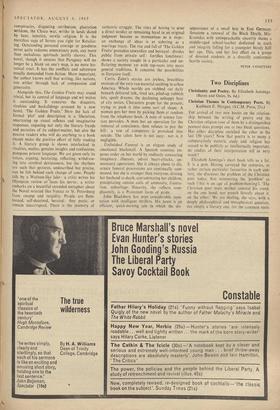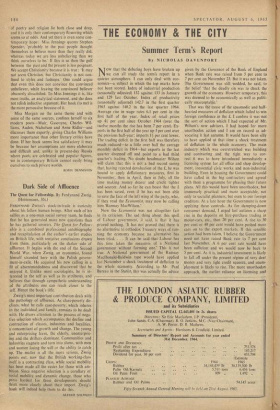Two Disciplines
Christianity and Poetry. By Elizabeth Jennings. ( Burns and Oates, 9s. 6d.) Christian Themes in Contemporary Poets. By Kathleen E. Morgan. (S.C.M. Press, 21s.)
THE arrival of two new books on the relation- ship between the writing of poetry and the Christian religion (one of them by a distinguished poetess) does prompt one or two bleak questions. Has either discipline enriched the other in the last 150 years? Now that poetry is to many a comparatively esoteric study and religion has ceased to be publicly or intellectually important, do studies of their interpretation tell us very much?
Elizabeth Jennings's short book tells us a lot. It is a gem. Having surveyed the centuries, or rather certain particular favourites in each cen- tury, she discusses the problem of the Christian poet today, first minimising the 'problem' as such ('this is an age of problem-hunting'). 'The Christian poet must neither conceal his creed, on the one hand, nor preach fiercely about it, on the other.' We are dealing, she says, with a deeply philosophical and metaphysical question, not simply a literary one, for the common roots
of poetry and religion lie both close and deep, and it is only their contemporary flowering which seems so at odds. And yet there is even some con- temporary hope: Miss Jennings quotes Stephen Spender, 'probably in the past people thought themselves to believe more than they really did, whereas today we are less unbelieving than we think ourselves to be: If this is so then the gulf between the past and the present is less poignant. We accept Christianity because it is true : 'It may not seem Christian, but Christianity is not con- fined to styles and fashions.' One could argue that even this does not convince the convinced unbeliever, while leaving the convinced believer obscurely dissatisfied. To Miss Jennings it is, like most truths, an analytical statement, and she does not relish inductive argument. Her book (to me) is the more persuasive because of it, Miss Morgan on the same theme and with some of the same sources, confines herself to six modern poets--Muir, Gascoyne, Charles Wil- liams, Auden, Nicholson and Anne Ridler—and discusses them expertly, giving Charles Williams more importance than other literary critics have done. If her book seems less satisfactory it may be because her assumptions are more elaborate and difficult and, unlike in present-day Russia where poets are celebrated and popular figures, we in contemporary Britain cannot easily bring ourselves to such private worlds.
ROBIN DENNISTON































 Previous page
Previous page